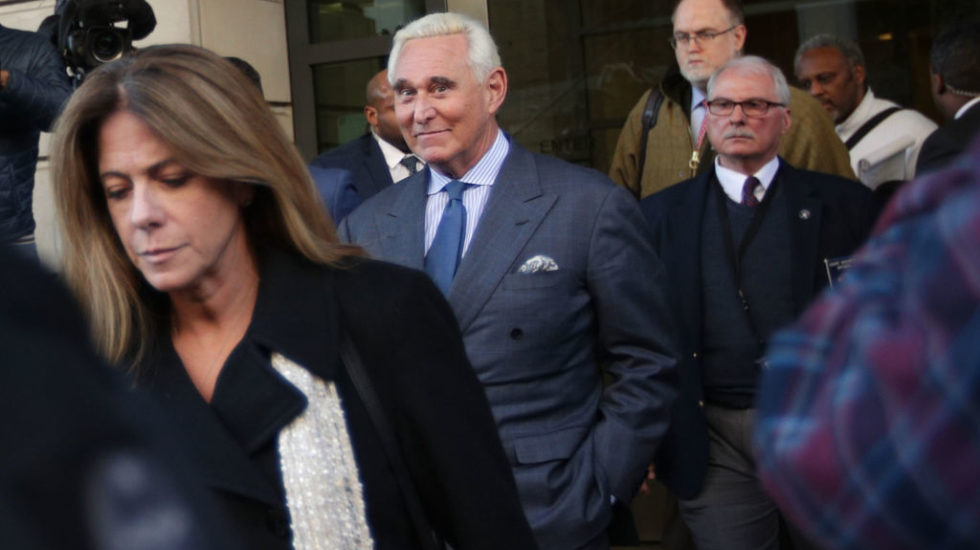This is the latest in a series of posts by Steven J. Harper, creator and curator of the Trump-Russia Timeline, on recent happenings with Donald Trump and Russia.
Roger Stone’s attorneys put him on the witness today to explain his Feb. 18 Instagram photo of the presiding judge in his case. It included crosshairs near her head.
Marked as Exhibit 1 of the hearing, the accompanying text accused “Deep State hitman Robert Mueller” of using “legal trickery” to guarantee that his “upcoming show trial is before Judge Amy Berman Jackson, an Obama appointed Judge who dismissed the Benghazi charges against Hillary Clinton and incarcerated Paul Manafort prior to his conviction for any crime.” But by the end of that day, the image was removed and, through his attorneys, Stone had filed an apology with the court:
“Please inform the Court that the photograph and comment today was improper and should not have been posted. I had no intention of disrespecting the Court and humbly apologize to the Court for the transgression.”
The following morning, Judge Jackson ordered today’s hearing at which Stone was required show cause why the court’s previous media contact order in the case and/or the conditions of release should not be modified or revoked.
Putting any criminal defendant on the witness stand is risky, in part because it waives the defendant’s Fifth Amendment right against self-incrimination. But with respect to the gag order, Stone’s signed apology (transmitted through his lawyers’ unusual “Notice of Apology”) probably waived that right anyway. Another risk is that, after taking the stand, the defendant might lie and create new, independent criminal exposure to perjury charges. In any event, Stone’s Instagram post had placed him in danger of pre-trial incarceration, leaving him and his attorneys few options.
So after swearing to tell the truth, Stone reiterated his apology, using phrases that included: “I am kicking myself over my own stupidity… I offer no excuse for it… This is just a stupid lapse in judgment…[I]t was an egregious mistake.” Stone claimed that he was under stress and having trouble putting food on his table and paying his rent.
In response to the judge’s questions, Stone admitted that he posted the offending image. But he said that he has five or six volunteers, and couldn’t say who chose it, who sent him the image, or whether it was sent via text or email. In response to questions about his social media operation, Stone suggested that someone else may have used his phone to find photo: “I do not exclusively use my own phone, that’s what I’m saying.” Stone also named four of his volunteers, saying that he couldn’t recall the names of all volunteers working for him a few days ago.
An attorney in special counsel Robert Mueller’s office asked, “You can’t remember the people who worked for you four days ago?”
Stone responded, “No.”
Judge Jackson observed that Stone has insisted that his name be in the media every day since his arrest. Even after apologizing, he continued talking every single day. She asked Stone’s attorney, “Why won’t this happen in the future?”
“Sometimes a person learns a lesson, especially when a person is unrestrained in his speaking” the lawyer answered. “It’s indefensible.”
“I agree with you there,” the judge said.
The government’s attorney argued for a stricter gag order, saying that Stone’s testimony was not credible. “That he committed a lapse in judgment is belied by the fact that even after he realized the post was a mistake, he continued to make statements to the media that amplified that message.”
After a recess, the judge returned with her ruling. She said that Stone has decided to pursue a strategy of attacking others. The Instagram post had a “more sinister message” from Stone, who “fully understands the power of words and symbols.”
“Thank you,” the judge said, “but the apology rings quite hollow” Finding his testimony not credible (“couldn’t keep his story straight on the stand”) and that his release under the current media contact order would pose a risk to the public, she ruled, “No, Mr. Stone, I’m not giving you another chance.”
The court could have concluded that Stone’s incitement to violence aimed at a federal judge was at least as dangerous to the judicial system as the witness tampering that caused her to jail Paul Manafort pending trial. In that respect, Judge Amy Jackson Berman gave Stone a break. She ordered that Roger Stone can no longer speak publicly about the case or any participants in it.
But the judge warned that next time would be worse:
“Today I gave you a second chance. This is not baseball, you don’t get a third chance.”
Steven J. Harper is the creator and curator of the Trump-Russia Timeline appearing at Dan Rather’s News & Guts and at Just Security. He is an attorney, adjunct professor at Northwestern University Law School, and author of four books, including Crossing Hoffa — A Teamster’s Story (Chicago Tribune “Best Book of the Year”) and The Lawyer Bubble — A Profession in Crisis. He blogs at The Belly of the Beast. Follow him on Twitter (@StevenJHarper1).
